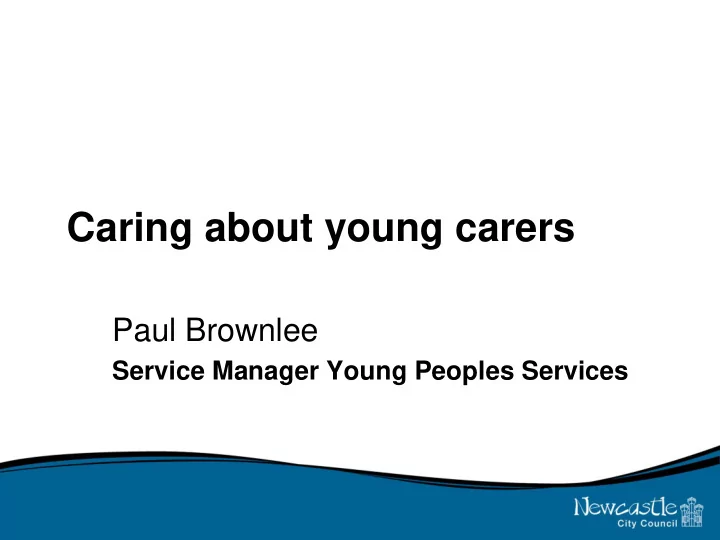

Caring about young carers Paul Brownlee Service Manager Young Peoples Services
England and Wales • 177,918 young (5 to 17 years) unpaid carers • 54% girls and 46% boys • Increase in the number of young unpaid carers between 2001 Majority of young carers contributed between 1 and 19 hours of unpaid care per week Source: Census 2011, Office for National Statistics (ONS)
North East • 7943 young (5 to 17 years) unpaid carers • Majority were girls • Increase in the number of young unpaid carers between 2001 and 2011 • Majority of young carers in the region contributed between 1 and 19 hours of unpaid care per week Source: Census 2011, Office for National Statistics (ONS)
Newcastle Source: Census 2011, Office for National Statistics (ONS)
Newcastle Source: Census 2011, Office for National Statistics (ONS)
Young Carers Strategy • Ensure that young carers are not disadvantaged by their caring role and responsibilities • There is early identification and intervention to prevent children and young people taking on inappropriate levels of care • To ensure that children and young people have the best possible chance of fulfilling their potential
Key principles • To safeguard children • Develop a whole family approach to needs led assessments • Young carers and their families are the experts in their own lives • Young carers will have the same access to education and career choices as their peers • To continually raise awareness of young carers and, to support and influence change effectively • To provide safe, quality support to those children who continue to be affected by any caring role within their family
Introducing Amelia’s Story
Children and Families Act 2014 • Consolidates and simplifies the legislation relating to young carers assessments making rights and duties clearer to young people and practitioners • Extends the right to an assessment to all young carers under the age of 18 regardless of the level or type of caring • Requires a Local Authority to carry out an assessment of a young carers need for support on the appearance of need • Provides the appropriate links between children’s and adults legislation to enable local authorities to align the assessment of a young carer with an assessment of the person they care for
In practice, a local authority must • Take reasonable steps to identify the extent to which there are young carers within their area who have needs for support • Assess whether a young carer within their area has needs for support and if so, what those needs are
LA carrying out the young carers needs assessment must consider and decide • Whether the young carer has needs for support in relation to the care they provide or intend to provide if so • Whether those needs could be satisfied by services the LA may provide under Section 17 Children’s Act 1989 and • If they could be satisfied, whether or not to provide any such services in relation to the young carer
In practice • Assess the needs of the adult or child who needs care and support • A whole family approach is key • Assessments should ascertain why a child is caring and what needs to change in order to prevent them undertaking excessive or inappropriate caring responsibilities which could impact adversely on their welfare, education or social development • Consideration must be given to whether a young carer is a ‘child in need’ and whether their welfare or development may suffer if support is not provided to them and/or their family
Continuum of Help and Support NSCB – February 2014
Thank you
Recommend
More recommend